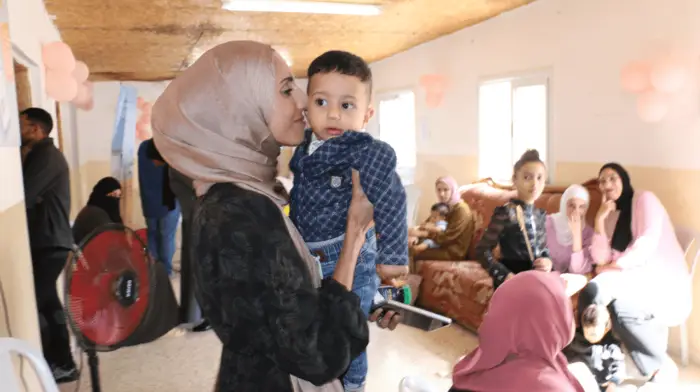In the West Bank, mobile healthcare teams are a lifeline amid crisis - occupied Palestinian territory

In the West Bank, within the State of Palestine, Mariam Al Zeer, a 55-year-old resident of the Al Uqban village in Bethlehem, stood in line as a mobile health team made its way to the clinic. The current clinic is in poor condition, lacking both staff and medical supplies, and Israeli authorities have restrictions that prevent the creation of more permanent healthcare facilities.
The mobile healthcare teams are filling in the gaps as best they can, but there are significant shortages of both personnel and essential supplies.
Ms. Al Zeer expressed her appreciation for their presence but noted that weekly visits are insufficient. "On certain days, we have 50 women coming in; perhaps 30 receive their medication, while 20 leave empty-handed due to shortages," she explained.
The teams make weekly trips to villages with populations of around 2,000 to 3,000 people, usually stopping at three to four villages each day. They typically spend around two hours in each place.
When they deplete their time or resources, the nearest clinic is a long walk of about an hour and a half to two hours – provided they can actually make the journey. Since the outbreak of conflict in Gaza, access to the village has been restricted by the closed gate.
“On two occasions, I took my son, who was running a fever, to the mobile clinic, but they ran out of fever medication to provide him,” shared Duaa Adwa, 31, with UNFPA, the United Nations agency focused on sexual and reproductive health.
To get to the other health center, we either have to take two taxis and then walk the rest of the way, or just walk the entire distance," she explained. "Previously, it only took about ten minutes by car."
The mobile healthcare teams, run by the Palestinian Medical Relief Society with assistance from UNFPA, provide essential services to at-risk and remote communities across Area C of the West Bank. The presence of Israeli military forces and violence from settlers pose considerable obstacles to accessing basic healthcare for the villages in this region.
Even with the difficulties they face, the mobile teams successfully provide a variety of essential health services, including maternal care before and after childbirth, family planning support with advice on contraceptive choices, and mental health assistance.
The teams are essential in identifying and addressing gender-based violence, while also promoting community strength by conducting health awareness workshops and providing first-aid training.
However, they are unable to help everyone. Among the approximately 189 communities in Area C that require assistance, six of them cannot be visited by mobile healthcare teams due to financial constraints. It’s estimated that between $18,000 and $24,000 each month would be necessary to provide services to these six underserved communities.
However, even the communities that get regular visits still face significant unmet needs, as the teams and clinics lack the resources to fully address them.
When the mobile teams are absent, numerous people dread what might happen.
Duaa Al Shweiki, a young volunteer, shared her thoughts on the difficult situation: "Unfortunately, the grim reality is that if someone requires immediate assistance, they are likely to pass away before reaching a hospital."
A demand for transformation
As the mobile clinic was getting ready to depart from Al Uqban, Dalal Farhan, 38, who previously volunteered with the team, shared her experience of now being one of the patients benefiting from their services.
"Once my son came into the world, I had to pause my volunteering to take care of him. He was diagnosed with diabetes at birth," she shared. "I receive his medication at no cost here. Without this assistance, we wouldn't manage. There’s no alternative for us."
UNFPA, along with its partner organizations, operates four mobile clinics in Area C, serving the Hebron, Bethlehem, Qalqilya, and Tulkarem governorates. These clinics have provided assistance to more than 30,000 local residents.
The future remains unpredictable. The existing funding has supported the mobile teams' services for around a year, but there are significant obstacles to obtaining additional financial support. If conditions stay the same, the number of communities lacking access to mobile clinic services could increase to 96 by 2025.
"The clinic provides some relief," said Naheel Zeer, 56. "However, we require additional support. We are quite distant from any medical practitioners or healthcare facilities."































































